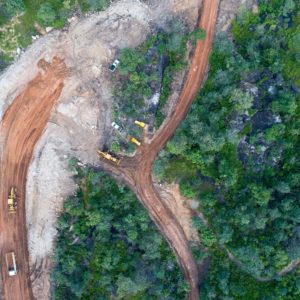Mining activities have profound impacts on the world’s forests - from direct tree cover loss at mine sites to widespread indirect and cumulative effects that endanger high-integrity forests, biodiversity hotspots, and forest-dependent communities. Although mining occupies a small fraction of global land, its operations disproportionately affect ecologically sensitive regions, exacerbating deforestation and degradation in critical areas.
This briefing paper examines the capacity of voluntary sustainability initiatives (VSIs) to mitigate these harmful forest impacts. Drawing on a comprehensive literature review, an analysis of 26 standards and guidance documents from 20 VSIs, and insights gathered from interviews with representatives of 14 VSIs, the study identifies key challenges facing VSIs. These include:
- Limited coverage and specificity of forest issues: VSI guidance is often global in scope and includes only broad, non-biome-specific language on managing risks and impacts. Neither the specific risks to forests nor the full lifecycle of forest-risk activities inherent to mining activities, from exploration through site closure, are usually addressed.
- Inadequate representation of forest-related perspectives in VSI governance: Forest, nature, and biodiversity experts, as well as Indigenous voices and representatives from low- and middle-income countries, are not included in board-level or stakeholder perspectives of many VSIs, resulting in standards that do not sufficiently account for related issues.
- Weak business case for sustainability: VSIs alone face challenges in incentivizing companies to surpass regulatory minimum performance standards, a challenge compounded by limited market demand and low willingness to pay a premium for more responsibly produced goods.
- Supply chain complexity and data limitations: The opacity of global mineral supply chains and inconsistent methodologies for measuring forest impacts hinder insight into mining’s true forest impacts and therefore limit accountability.
In response to these challenges, this paper outlines key opportunities for VSIs to strengthen their coverage of forest issues and to leverage their influence over mining sector companies. VSIs in the mining sector have grown during the past several years in membership, geographic spread, and commodity coverage. VSIs are closely embedded in the mining industry, and they have the potential to play a greater role in influencing and guiding companies to more responsible approaches.
Moreover, non-VSI stakeholders—such as upstream and downstream companies, financial institutions, governments, international political bodies, and development finance institutions—are called upon to support VSI efforts. Their roles include engaging in integrating enhanced VSI standards into contractual and investment conditions, aligning public policies with robust forest conservation goals, and funding capacity-building initiatives that drive measurable improvements in forest outcomes.
To improve on addressing forest risks (and other sustainability issues), the mining sector must adopt a more holistic understanding of the risks and impacts of its operations across not just forests, but environmental impacts more broadly, as well as their connection to human rights and the sector’s long-term financial viability. By addressing the identified challenges with targeted, collaborative solutions, stakeholders can work collectively to advance a more accountable, transparent, and forest-friendly mining sector.



